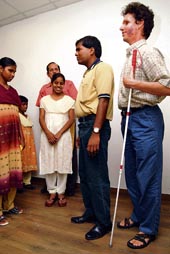 |
| Daniel Kish (right) demonstrates the use of echolocation to a blind student. Picture by Anindya Shankar Ray |
Tek Lal Paswan, 20, lost his eyesight when he was 10 because of malnutrition. The Class X student relies on his cane and helpful people on the streets of hometown Bokaro to travel safely.
Manti Pradhan, 22, from south Midnapore has been blind since she was a year old. The BA final-year student has to request strangers to help her board buses and trains
Tek Lal and Manti are hoping that the new skill being taught in a workshop they are attending in the city will enable them to find their way through busy streets anywhere without turning to strangers for help.
Echolocation involves teaching the brain to perceive images with the help of sound stimuli and is commonly used by visually challenged people abroad, especially the UK.
The five-day workshop, organised by Mission of Mercy Hospital, is being conducted by Daniel Kish and Brian Bush of World Access for the Blind, an American non-profit organisation. The first training session was held on Monday.
Kish, who is himself blind since birth, said all visually challenged people were naturally inclined to use echolocation to a certain extent. What he and Bush have done is develop this method into a full-fledged curriculum.
The first stage of learning echolocation is “stimulus comparison” through exposure to diverse objects, like buildings and bushes. Students are taught to distinguish between them through the difference in sound reflected off each while clicking with the tongue.
The next stage is stimulus association, where students are required to compare an object with one perceived earlier. In the final stage, participants are taken to an unfamiliar location and asked to find their way through it using their new skill.
Tek Lal is confident of “picking up” echolocation quickly. “We use this method unconsciously,” he said.
Kish said a trained person would be able to accurately differentiate between objects solid and hollow, big and small, and gauge the distance at which it stands with just a click of the tongue. “A flat, dense object like a wall will produce a louder echo than a fence.”
Kish’s colleague, who has been blind from the age of 14, even does mountain biking and plays the bass guitar in a band. The duo would like to return to the city for a more comprehensive programme.
Jabesh Dutt, the founder-director of the Divine Fellowship Blind School where the workshop is being held, said the best part of the workshop was that the teachers were being trained, too. “We will incorporate the technique into our curriculum,” he added.











